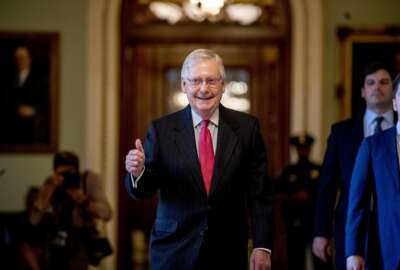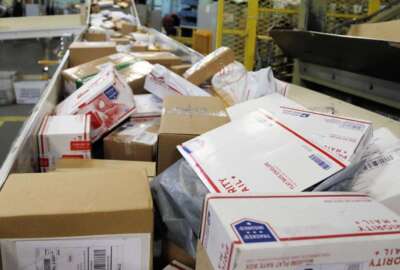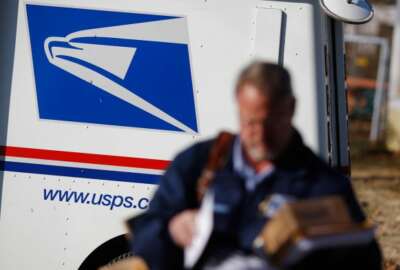
USPS seeks to hire retired employees, temporary workers as coronavirus takes toll on workforce
Given its current financial situation, only set to worsen under the pandemic, USPS and its unions fear the agency may not have the cash on hand to continue oper...
The Postal Service this week began sending mailings from the Centers for Disease Control and Prevention to every household with information on how to protect themselves during the coronavirus pandemic.
Meanwhile, the Food and Drug Administration is “actively working with test developers” on a coronavirus self-test that, once ready, will be in popular demand from quarantined households.
And in the coming weeks, the Postal Service will distribute millions of checks for stimulus rebate payments that President Donald Trump signed into law.
The Postal Service is considered an “essential service,” meaning more than 600,000 employees continue with business as usual during the coronavirus pandemic. And for these scenarios, “there is no substitute for the Postal Service’s universal delivery network,” said Fredric Rolando, the president of the National Association of Letter Carriers President.
But given its current financial situation, which will only worsen under the pandemic, USPS and its unions fear it may not have the cash on hand needed to continue operations past this summer.
The $2 trillion coronavirus emergency spending bill President Donald Trump signed into law Friday would allow the Postal Service to borrow another $10 billion from the Treasury Department.
But that’s a significant departure from a bill House Democrats introduced Monday to give USPS $25 billion to spend over the next two years. The House bill would have also wiped away $11 billion in debt and let the Postal Service borrow another $15 billion.
A USPS spokesman said the Postal Service appreciates the limited emergency borrowing authority during this COVID-19 pandemic, but the agency “remains concerned that this measure will be insufficient to enable the Postal Service to withstand the significant downturn in our business that could directly result from the pandemic.”
USPS expects decreased economic activity will lead to a “rapid drop in mail volumes and a significant loss in needed revenues, which puts our ongoing ability to provide our vital federal service at risk,” Dave Partenheimer, an agency spokesman told Federal News Network.
House Democrats have pressed for Congress to take up more rounds of emergency funding that would support the Postal Service.
In the meantime, USPS will continue to “work with policymakers in the months ahead to ensure that Americans have access to the mail during this critical time in our nation’s history,” Partenheimer said.
“As Americans are urged to stay home, the importance of the mail will only grow as people will need access to communications and essential packages such as prescription drugs and other necessities. This is particularly true in rural and other areas, where the Postal Service may be the only affordable delivery provider available to fulfill the needs of these communities,” the spokesman said.
Aside from the agency’s worsening financial picture, the pandemic has taken a toll on its workforce: USPS says 111 of its employees have tested positive for COVID-19, the disease caused by the current strain of the coronavirus.
Of those, NALC said one of its members, Rakkhon Kim, a 50-year old letter carrier in New York City, died of complications from the virus on Wednesday.
“We send our deepest sympathies and heartfelt thoughts and prayers to Rakkhon’s family, loved ones, friends and co-workers,” Rolando said in a statement.
On Friday, the American Postal Workers Union and the Postal Service reached an agreement that would allow USPS to hire additional temporary employees through May 25.
The agency would be allowed to hire mail processing assistants and clerk assistants at facilities that are “experiencing high absenteeism because of the COVID-19 pandemic and the liberal leave policy” for employees who are sick or caring for children affected by school or care facility closures.
The agreement would require career employees and postal support employees to be “utilized to the maximum hours allowed.”
It would also allow the Postal Service to bring back retired employees as extra clerk assistant to “provide supplemental support” during this period — an action that the Veterans Affairs Department recently took with its own retired workforce.
Copyright © 2024 Federal News Network. All rights reserved. This website is not intended for users located within the European Economic Area.
Jory Heckman is a reporter at Federal News Network covering U.S. Postal Service, IRS, big data and technology issues.
Follow @jheckmanWFED
Related Stories

Updated: House coronavirus spending bill gives USPS $25B, wipes slate on its Treasury debt




